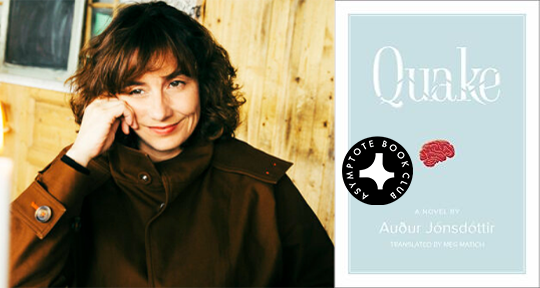Auður Jónsdóttir’s critically acclaimed Quake is a novel of a woman in fragments. Recovering from an amnesia-inducing seizure, Saga is made to walk through her life based on hints, illusions, and the capricious words of others. Translated into a haunting, lyrical English by Meg Matich, Quake traverses and trespasses across the demarcations of a single life to mark the entrancing dialogues between the self and other, fact and fiction, and a woman and her selves. In the following interview, Barbara Halla speaks to Matich about the trauma within the text, Icelandic women writers, and the interrogations of motherhood.
The Asymptote Book Club aspires to bring the best in translated fiction every month to readers around the world. You can sign up to receive next month’s selection on our website for as little as USD15 per book; once you’re a member, join our Facebook group for exclusive book club discussions and receive invitations to our members-only Zoom interviews with the author or the translator of each title.
Barbara Halla (BH): Before we do a deep dive on the actual themes of the book and the story, I like to get a sense of how translators work and how they find their projects. How did you get interested in Iceland, in Icelandic, and how did you come across the book? And perhaps, why did you choose to translate it?
Meg Matich (MM): I had gotten a fellowship from Columbia to go to Slovakia for a tandem translation and along the way, I had to stop off in Berlin to visit a German poet I had been translating for class. The classmates suggested to me I do a layover in Iceland; flights were inexpensive, the hotels were relatively inexpensive. This was 2012, I believe.
I felt this very strong and immediate pull, especially because I was surrounded by ocean and a cold coast, both things that I like. I found out about Icelandic grammar just by asking about it in bookshops and it fascinated me—I like complex grammars as well. And I like strange things. Icelandic, I still think it sounds like cicadas, so I became very attached to it immediately. And soon I found my voice in someone else’s, which is something I hadn’t felt before— translation had always been a very sort of practical exercise to me, or a way to think about language. And it certainly caused me to write poetry differently than I had previously.
I came across Quake by invitation. Jennifer Baumgardner of Dottir Press had done some research on me, and we just started a relationship from there. I found Auður strange and chaotic and fascinating. And she is spellbinding when she talks. You don’t want to do anything else but listen to her. I guess that’s kind of what happened to the book. I was more engaged with her as a person than with the text at first, but that’s how I understood why it was meandering, and tangential.
BH: You also recently translated Magma by Þóra Hjörleifsdóttir and I find it a fascinating text to compare Quake to. In the English-speaking market, there’s been a push to hear more stories from women; do you find that something similar is happening in Iceland? What would you say the place that women’s writing takes in Icelandic literature?
MM: I can’t make general sweeping statements—that it has always been one way or another. In Icelandic sagas, and they’re always troublemakers, seekers, they cause misfortune. But in recent history, I would say yes, there has been a continued trend that more women’s stories are being told. And I want to pin this to one author: a woman called Ásta Sigurðardóttir. READ MORE…


